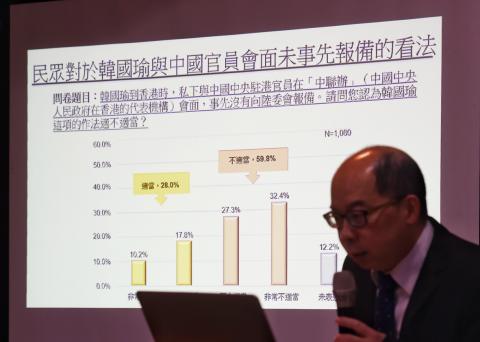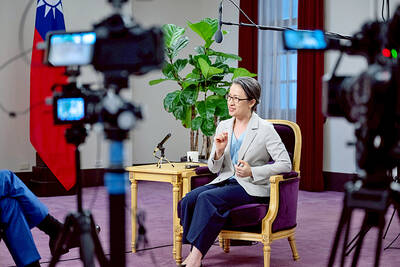More than half of the public disapproved of Kaohsiung Mayor Han Kuo-yu’s (韓國瑜) visit to China’s liaison office in Hong Kong and the support that he expressed for the “1992 consensus” while in China, a poll released yesterday by the Cross-strait Policy Association found.
Asked about Han’s unreported visit to the Chinese Liaison Office of the Central People’s Government in the Hong Kong Special Administrative Region, 59.8 percent of respondents said it was inappropriate, while only 28 percent said it was appropriate, the poll showed.
Fifty-one percent of respondents said that Han’s strong support of the “1992 consensus” during his China trip meant that he accepts China’s “one country, two systems” model, while 34.2 percent did not think that is what it meant, the poll showed.

Photo: Fang Pin-chao, Taipei Times
Han’s explicit support for the “1992 consensus” while in China was inappropriate, according to 50.4 percent of respondents, compared with 37.5 percent who said it was appropriate, the poll showed.
The so-called “1992 consensus,” a term former Mainland Affairs Council chairman Su Chi (蘇起) in 2006 admitted making up in 2000, refers to a tacit understanding between the Chinese Nationalist Party (KMT) and the Chinese government that both sides of the Taiwan Strait acknowledge that there is “one China,” with each side having its own interpretation of what “China” means.
The poll showed President Tsai Ing-wen (蔡英文) to be the most popular candidate for next year’s presidential election if she and former premier William Lai (賴清德) are on the same ticket running against Han.
Asked to choose a president from among Tsai, Han and Taipei Mayor Ko Wen-je (柯文哲), 34.8 percent of respondents chose Han, 31.1 percent chose Tsai and 24.6 percent chose Ko.
Asked to choose a president from among Lai, Han and Ko, most respondents, or 33.2 percent, still chose Han, while 32.1 percent chose Lai and 25.3 percent chose Ko.
If Tsai ran for re-election with Lai as her vice president, 35.7 percent of respondents said they would vote for her, compared with 34.7 percent who would still choose Han and 20.6 percent who would back Ko.
The poll showed that 48.1 percent of respondents agreed that Lai should run as Tsai’s vice president, while 31.3 percent disagreed.
According to the poll, Han’s trip to China sparked mixed reactions, National Taiwan Normal University political science professor Fan Shih-ping (范世平) said.
“The honeymoon period is over and public support for Han appears to be falling,” he said.
The successful deals that Han returned from China with did not give him a significant lead over Tsai and Lai in the poll, Taipei University of Marine Technology assistant professor Wu Chien-chung (吳建忠) said.
Although drawing attention to the economic benefits of cross-strait cooperation, Han has failed to neutralize Beijing’s authoritarian image, Wu added.
“The KMT has not properly explained the difference between their ‘1992 consensus’ and China’s version,” he said.
The poll results suggest that “Taiwanese want cross-strait exchanges to be conducted in a transparent manner and based on equal standing,” Taiwan Think Tank member Doing Sy-chi (董思齊) said.
“Future presidential candidates can no longer rely on shallow slogans. They must delineate their platform on foreign relations, economic development, democracy and human rights issues,” he added.
The poll, which interviewed 1,080 respondents nationwide by telephone on Friday to Sunday, was weighted to fit the population profile and has a margin of error of 2.98 percentage points.

China might accelerate its strategic actions toward Taiwan, the South China Sea and across the first island chain, after the US officially entered a military conflict with Iran, as Beijing would perceive Washington as incapable of fighting a two-front war, a military expert said yesterday. The US’ ongoing conflict with Iran is not merely an act of retaliation or a “delaying tactic,” but a strategic military campaign aimed at dismantling Tehran’s nuclear capabilities and reshaping the regional order in the Middle East, said National Defense University distinguished adjunct lecturer Holmes Liao (廖宏祥), former McDonnell Douglas Aerospace representative in Taiwan. If

TO BE APPEALED: The environment ministry said coal reduction goals had to be reached within two months, which was against the principle of legitimate expectation The Taipei High Administrative Court on Thursday ruled in favor of the Taichung Environmental Protection Bureau in its administrative litigation against the Ministry of Environment for the rescission of a NT$18 million fine (US$609,570) imposed by the bureau on the Taichung Power Plant in 2019 for alleged excess coal power generation. The bureau in November 2019 revised what it said was a “slip of the pen” in the text of the operating permit granted to the plant — which is run by Taiwan Power Co (Taipower) — in October 2017. The permit originally read: “reduce coal use by 40 percent from Jan.

‘SPEY’ REACTION: Beijing said its Eastern Theater Command ‘organized troops to monitor and guard the entire process’ of a Taiwan Strait transit China sent 74 warplanes toward Taiwan between late Thursday and early yesterday, 61 of which crossed the median line in the Taiwan Strait. It was not clear why so many planes were scrambled, said the Ministry of National Defense, which tabulated the flights. The aircraft were sent in two separate tranches, the ministry said. The Ministry of Foreign Affairs on Thursday “confirmed and welcomed” a transit by the British Royal Navy’s HMS Spey, a River-class offshore patrol vessel, through the Taiwan Strait a day earlier. The ship’s transit “once again [reaffirmed the Strait’s] status as international waters,” the foreign ministry said. “Such transits by

Taiwan is doing everything it can to prevent a military conflict with China, including building up asymmetric defense capabilities and fortifying public resilience, Vice President Hsiao Bi-khim (蕭美琴) said in a recent interview. “Everything we are doing is to prevent a conflict from happening, whether it is 2027 or before that or beyond that,” Hsiao told American podcaster Shawn Ryan of the Shawn Ryan Show. She was referring to a timeline cited by several US military and intelligence officials, who said Chinese President Xi Jinping (習近平) had instructed the Chinese People’s Liberation Army to be ready to take military action against Taiwan